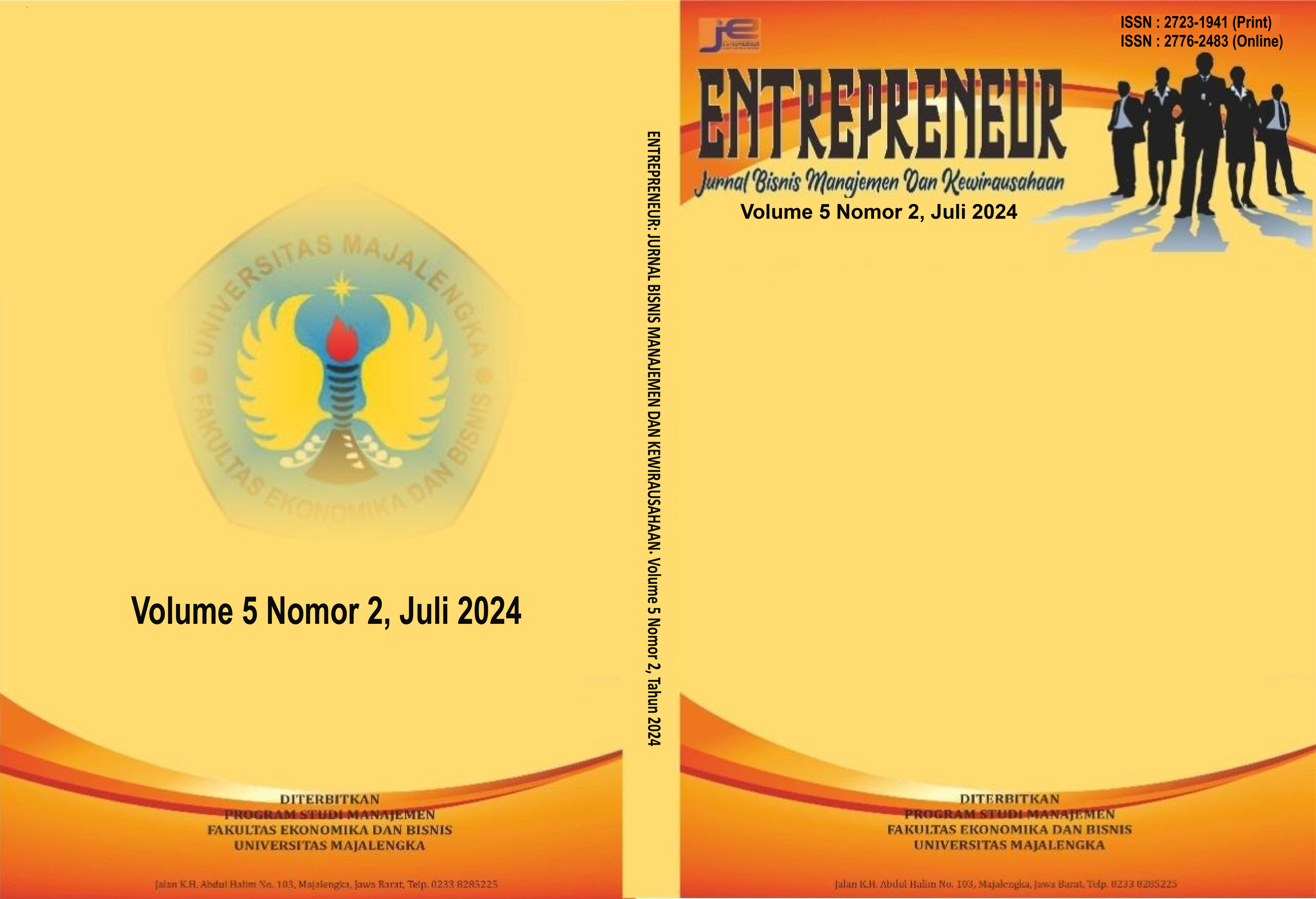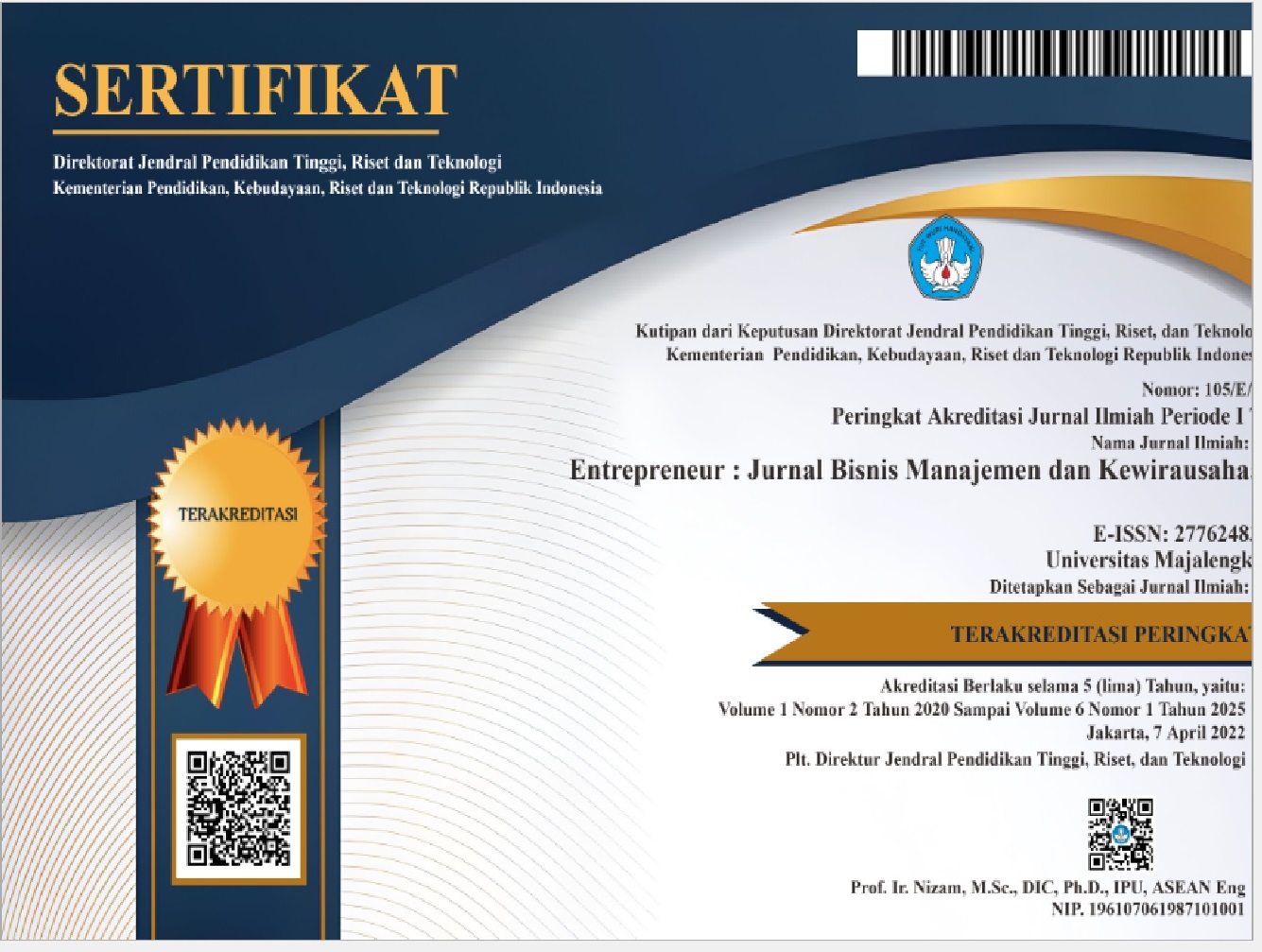Analisis Tingkat Penerimaan Tentang Penerapan Industri Hijau Pada Peraturan Pemerintah Sebagai Bentuk Eko-Efisiensi Dalam Meningkatkan Kinerja Hijau
DOI:
https://doi.org/10.31949/entrepreneur.v5i2.10768Abstract
Implementing eco-efficiency in the batik industry is important considering the currently developing environmental problems. In order to realize a sustainable batik industry with green performance, an analysis was carried out on the level of acceptance of applicable government regulations in order to change towards an independent green industry. In line with the research objective, it is to analyze the level of income of the batik industry regarding the implementation of government regulations relating to the green industry through the application of eco-efficiency in order to measure green performance in the batik industry. Through a survey method carried out on all batik industries by taking random samples from 500 batik industries in Pekalongan City. The research results show that for all respondents' answers to each question item, the results obtained were an average of 66.25% of batik industry players who had accepted the existence of a green industrial policy for the batik industry in accordance with the regulations stipulated in PERMENPERIN No. 10 of 2023. It appears as supporting data that results show that 60% of batik business actors also received training for the batik industry which has not received the title as a green industry.
Keywords:
Acceptance rate, batik industry, eco-efficiency, green industry, green performanceDownloads
References
Akhirul, Witra, Y., Umar, I., & Erianjoni. (2020). Dampak Negatif Pertumbuhan Penduduk Terhadap Lingkungan Dan Upaya Mengatasinya. Jurnal Kependudukan Dan Pembangunan Ligkungan, 1(3), 76–84.
Bangsawan, S. (2017). PROSIDING SENAPENMAS 2018 Seminar Nasional Hasil Penelitian dan Pengabdian kepada Masyarakat. In Pengabdian Pada Masyarakat Melalui Desiminasi Hasil-Hasil Penelitian Terapan (Issue November).
Dunlap, R. E. (2018). Environmental sociology. In Companion to Environmental Studies. https://doi.org/10.4324/9781315640051-63
Fahma, F., Zakariya, R., & Gumilang, R. F. (2019). PENILAIAN KESIAPAN UKM BATIK DALAM SERTIFIKASI SNI (STUDI KASUS : UKM BATIK DI SURAKARTA) Assessment of SMEs Readiness on Indonesian National Standard (SNI) Certification (Case Study: SME Batik in Surakarta). 2009.
Gupta, H., & Barua, M. K. (2018). A framework to overcome barriers to green innovation in SMEs using BWM and Fuzzy TOPSIS. Science of the Total Environment, 633, 122–139. https://doi.org/10.1016/j.scitotenv.2018.03.173
Kristiani, A. W., & Soetjipto, W. (2019). Urbanisasi, Konsumsi Energi, dan Emisi CO2 : Adakah Perbedaan Korelasinya di Kawasan Barat Indonesia (KBI) dan Kawasan Timur Indonesia (KTI)? Jurnal Wilayah Dan Lingkungan, 7(3), 166–180. https://doi.org/10.14710/jwl.7.3.166-180
Kumar Anuj, Ph. D., & Ayedee Nishu Dr. (2021). Technology Adoption: a Solution for Smes To Overcome Problems During Covid-19. Academy of Marketing Studies Journal, 25(1).
Poon, S. (2020). Symbolic Resistance: Tradition in Batik Transitions Sustain Beauty, Cultural Heritage and Status in the Era of Modernity. World Journal of Social Science, 7(2), 1. https://doi.org/10.5430/wjss.v7n2p1
Qustolani, A., & Hernita, N. (2023). Pengaruh Motivasi Berwirausaha Dan Pengetahuan Kewirausahaan Terhadap Minat Berwirausaha Di Kabupaten Majalengka. Entrepreneur: Jurnal Bisnis Manajemen Dan Kewirausahaan, 4(1), 9–22. https://doi.org/10.31949/entrepreneur.v4i1.3771
Sofyan, I., & Karmela Fitriani, L. (2023). Pengaruh Strategi Green Marketing Terhadap Kepuasan dan Loyalitas Pelanggan Mcdonald’s (Study Kasus McDonalds di Kota Cirebon): Study Kasus McDonald’s di Kota Cirebon. Entrepreneur: Jurnal Bisnis Manajemen Dan Kewirausahaan, 4(2), 285–300. https://doi.org/10.31949/entrepreneur.v4i2.5662
Setyanto, R. P. (2018). Perilaku Konsumsi Sadar Ekologis: Pendekatan Pemodelan Multipe Indicator Multiple Causes. Jurnal Ekonomi, Bisnis, Dan Akuntansi, 20(1).
Sugandini, D. (2020). PERILAKU KONSUMEN PRO-LINGKUNGAN. April.
Sulaksono, H. (2018). Roadblock Implementasi Peran Quadruple Helix dalam Upaya Meningkatkan Kapabilitas Inovasi dan Keunggulan Bersaing. STIE Mandala, 366–381.
Sunarjo, W. A. (2023). Entrepreneur Determinants of Purchase Intention Tendencies of Career Women on Green Products. http://ejournal.unma.ac.id/index.php/entrepreneur
Sunarjo, W. A., Manalu, V. G., & Adawiyah, W. R. (2021). Nurturing consumers’ green purchase intention on natural dyes batik during craft shopping tour in the batik city of Pekalongan Indonesia. Geojournal of Tourism and Geosites, 34(1), 186–192. https://doi.org/10.30892/gtg.34124-635
Sunarjo, W. A., Pekalongan, U., Suroso, A., Soedirman, U. J., Setyanto, R. P., & Soedirman, U. J. (2022). KOMITMEN RESONANSI- LINGKUNGAN IKM BATIK. June.
Sunarjo, W. A., Setyanto, R. P., & Suroso, A. (2022). Motives And Green Innovation Performance in Indonesian Small and Medium Enterprises (Sme’s) Batik-A Qualitative Case Study. Quality - Access to Success, 23(186), 74–82. https://doi.org/10.47750/QAS/23.186.10

Published
How to Cite
Issue
Section
License
Copyright (c) 2024 Wenti Ayu Sunarjo, Maghfiroh, Nur Susanti, Muhammad Milzam, Nur Ermawati, Yovita Christi, Alilisa Rahmawati

This work is licensed under a Creative Commons Attribution-ShareAlike 4.0 International License.
COPYRIGHT NOTICE
An author who publishes in the Entrepreneur: Jurnal Bisnis Manajemen dan Kewirausahaan agrees to the following terms:
1. Author retains the copyright and grants the journal the right of first publication of the work simultaneously licensed under the Creative Commons Attribution-ShareAlike 4.0 License that allows others to share the work with an acknowledgment of the work's authorship and initial publication in this journal
2. The author is able to enter into separate, additional contractual arrangements for the non-exclusive distribution of the journal's published version of the work (e.g., post it to an institutional repository or publish it in a book) with the acknowledgment of its initial publication in this journal.
3. The author is permitted and encouraged to post his/her work online (e.g., in institutional repositories or on their website) prior to and during the submission process, as it can lead to productive exchanges, as well as earlier and greater citation of the published work







